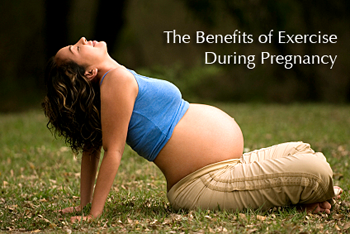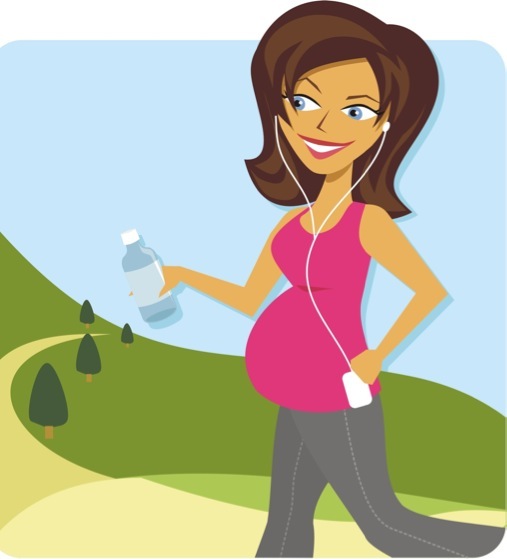
Regular physical activity provides many health and social benefits and may also help manage some symptoms of pregnancy. Unless you have complications, it should be possible to enjoy some level of physical activity throughout most of your pregnancy. If you are already fit and have a regular training routine you are ok to continue as long as you follow a few simple rules. However consult with your doctor or or healthcare professional before starting any new exercise program.
Benefits of exercise during pregnancy

Exercise during pregnancy offers many physical and emotional benefits. Physical activity may also help manage some symptoms of pregnancy and make you feel better, knowing you’re doing something good for yourself and your baby.
[highlight_text] Some of the benefits of exercising regularly throughout your pregnancy include:[/highlight_text]
Enjoyment
More energy
Stronger back muscles, which can help manage back pain and strain as your belly grows
Improved posture
Improved circulation
Weight control
Stress relief
Improved sleep
Preparation for the physical demands of labour
Faster recuperation after labour
Faster return to pre-pregnancy fitness and healthy weight
Increased ability to cope with the physical demands of motherhood.
[highlight_text] Exercise suggestions during pregnancy
[/highlight_text]
It is important to discuss your exercise plan with your doctor, as each pregnancy is different. In general, healthy women who have uncomplicated pregnancies can continue their previous exercise program after consultation with a doctor. It is also considered safe to start a new exercise program during pregnancy if given the all-clear by your doctor.
If you have been cleared to exercise, it is recommended that you:
Do at least 30 minutes of moderate-intensity physical activity on most, if not all, days of the week.
Do no more than three sessions per week of vigorous exercise by the third trimester.
Let your body be your guide. You know you’re at a good exercise intensity when you can talk normally and not become exhausted too quickly.
Be guided by your doctor, physiotherapist or healthcare professional.
[highlight_text] Suggested exercise activities during pregnancy
[/highlight_text]
Activities that are generally safe during pregnancy, even for beginners, include:
Walking
Swimming
Cycling – outdoors or on a stationary bicycle
Exercise in water (aquarobics)
Yoga, stretching and other floor exercises
Dancing
Pilates
Pregnancy exercise classes.
Some activities are safe when done in moderation by pregnant women who had already been participating in these activities prior to pregnancy. These include running and strength training.
[highlight_text] Cautions for pregnancy exercise
[/highlight_text]
While most forms of exercise are safe, there are some exercises that involve positions and movements that may be uncomfortable or harmful for pregnant women. Be guided by your doctor or physiotherapist, but general cautions include:
Avoid raising your body temperature too high – for example, don’t soak in hot spas or exercise to the point of heavy sweating. Reduce your level of exercise on hot or humid days.
Don’t exercise to the point of exhaustion.
If weight training, choose low weights and medium to high repetitions – avoid lifting heavy weights altogether.
Avoid exercise if you are ill or feverish.
If you don’t feel like exercising on a particular day, don’t! It is important to listen to your body to avoid unnecessarily depleting your energy reserves.
Don’t increase the intensity of your sporting program while you are pregnant, and always work at less than 75 per cent of your maximum heart rate.
In addition, if you develop an illness or a complication of pregnancy, talk with your doctor or midwife before continuing or restarting your exercise program.
[highlight_text] Pelvic floor exercises and pregnancy
[/highlight_text]
Your pelvic floor muscles are weakened during pregnancy and during birth (vaginal delivery), so it is extremely important to begin conditioning the pelvic floor muscles from the start of your pregnancy.
Appropriate exercises can be prescribed by a physiotherapist. It is important to continue with these throughout your pregnancy and resume as soon as is comfortable after the birth.
[highlight_text] Abdominal exercises and pregnancy
[/highlight_text]
Strong abdominal muscles support your spine. The internal core and pelvic floor abdominal muscles act as a natural ‘corset’ to protect the pelvis and lumbar spine.
During pregnancy, it is common for women to experience the condition known as diastasis recti abdominis – a painless splitting of the abdominal muscle at the midline, also known as abdominal separation. Traditional sit-ups or crunches may worsen this condition, and can be ineffective during pregnancy.
Appropriate core stability exercises are recommended during pregnancy to strengthen the muscles of the abdomen:
Concentrate on drawing your belly button towards your spine.
Breathe out while pulling in your belly.
Hold the position and count to 10. Relax and breathe in.
Repeat 10 times, as many times a day as you are able.
You can perform this exercise sitting, standing or on your hands and knees.
[highlight_text] Warning signs when exercising during pregnancy
[/highlight_text]
If you experience any of the following during or after physical activity, stop exercising immediately and see your doctor:
Headache
Dizziness or feeling faint
Heart palpitations
Chest pain
Swelling of the face, hands or feet
Calf pain or swelling
Vaginal bleeding
Contractions
Deep back or pubic pain
Cramping in the lower abdomen
Walking difficulties
An unusual change in your baby’s movements
Amniotic fluid leakage
Unusual shortness of breath.
All in all it is highly reccommended to stay fit and healthy during pregnancy you just have to be smart about it. Not one pregnancy or person is the same therefore what works for one woman may not work for another. It is crucial to listen to your body and give it what it needs, if you feel like training then train but if you are tired and need to rest then you need to rest. Pregnancy is an amazing experience that us women get to go through so learn to embrace it and enjoy the journey. Always speak to your Dr before starting anything new, if you are unsure about anything at all it is always best to check. Of course during pregnancy you can’t get any fitter as you can’t get your HR up that high for long periods but you can maintain some form of fitness, for me it has become more of a mental and emotinal journey rather than a physical. We can’t control the physical so it is best just to embrace what exercise means on different levels. Be proud of your beautiful bump and give your baby the best chance of having a healthy fit mummy post birth.

Reference: Better Health Channel
